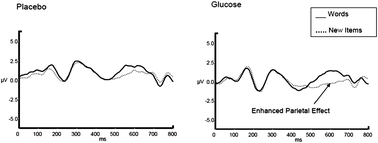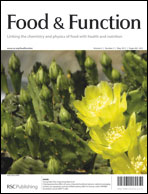Previous studies have reported that increasing glycaemia by a glucose-containing drink enhances memory functioning. The aim of the present study was to extend this literature by examining the effects of glucose on episodic memory as well as attention processes, and to investigate associated event-related potential (ERP) markers. Fifteen minutes after treatment (25 g glucose or placebo drink), 35 participants performed an old/new recognition memory task and a Stroop colour naming task. Consistent with previous research, when controlling for glucose regulation, cognitive facilitation was observed behaviourally for verbal memory, but there was also a trend towards attentional facilitation. Furthermore, across both domains, it was the most demanding task conditions that exhibited glucose sensitivity. In support of the behavioural results, the analysis of ERPs across treatment groups revealed an enhanced left-parietal old/new effect related to recollection, and also suggested modulation of attentional processes. The results suggest that glucose may facilitate attention as well as memory.

This article is Open Access
 Please wait while we load your content...
Something went wrong. Try again?
Please wait while we load your content...
Something went wrong. Try again?


 Please wait while we load your content...
Please wait while we load your content...